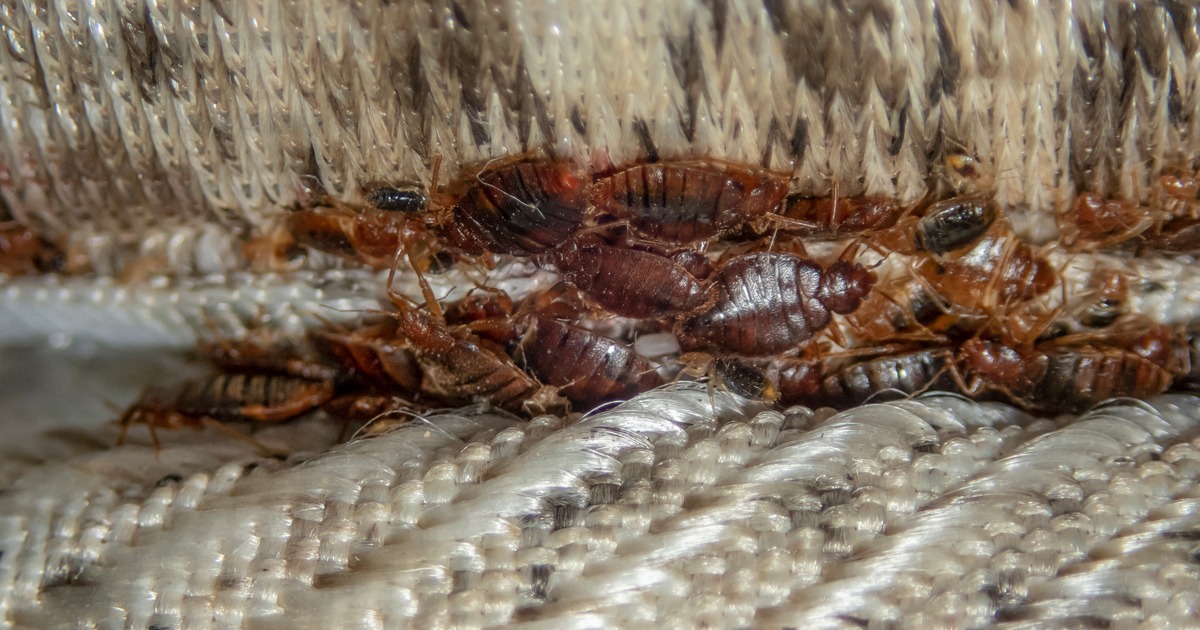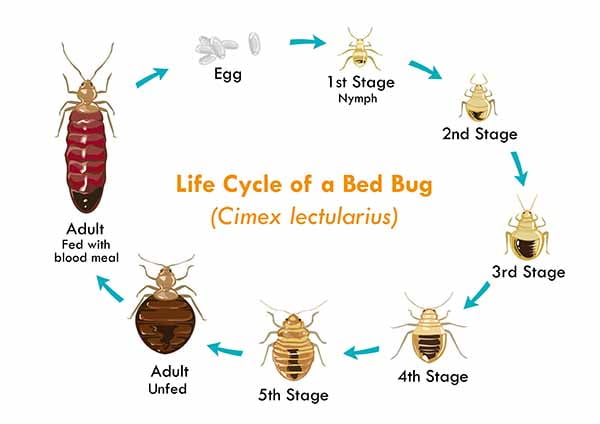Bed bugs can live without food for about 20 to 400 days, depending on the temperature and humidity of their surroundings. Their lifespan without a blood meal varies, but they can survive for a considerable amount of time without feeding.
If you’ve ever had to deal with a bed bug infestation, you know that these tiny pests can cause a lot of stress and frustration. One of the questions that often comes up when dealing with bed bugs is how long they can survive without food.
Understanding the feeding habits and survival instincts of bed bugs can help you develop a more effective plan for eliminating them from your home. We’ll explore the topic of how long bed bugs can live without a blood meal, and provide some insight into their behavior and resilience. By the end, you’ll have a better understanding of the timelines involved and how to address a bed bug infestation effectively.
Bed Bug Lifespan
Bed bugs are not just a nuisance but can also be a source of distress. Understanding their lifespan is crucial when dealing with an infestation. The lifespan of bed bugs varies, and their ability to survive without food is one of the factors that affect how long they live.
Life Stages Of Bed Bugs
Bed bugs go through several life stages, from eggs to adults. The life cycle of a bed bug consists of egg, nymph, and adult stages. Eggs hatch into nymphs, which go through five molting stages before reaching adulthood.
Factors Affecting Bed Bug Lifespan
Various factors can affect the lifespan of bed bugs. These include temperature, availability of food, and environment. Warmer temperatures can accelerate the development of bed bugs, while cooler temperatures can extend their lifespan. Additionally, the absence of a blood meal can lead to bed bugs entering a state of dormancy, allowing them to survive for months without feeding.

Credit: emoyer.com
Survival Without Feeding
Bed bugs are notorious for their ability to survive without a meal for extended periods. Understanding their persistence without feeding is crucial for effective extermination strategies and prevention efforts.
Ability To Survive Without Food
Bed bugs have an astounding ability to remain alive for prolonged periods without a blood meal. Under ideal conditions, they can survive for approximately six months without feeding. This resilience enables them to remain dormant and undetected, making them even more challenging to eradicate.
Effects Of Starvation On Bed Bugs
During times of food scarcity, bed bugs enter a state of hibernation, slowing down their metabolic rate to conserve energy. This adaptation allows them to endure extended periods without sustenance, despite the detrimental impact on their reproductive capability. While the absence of food may affect their ability to lay eggs, adult bed bugs have been known to withstand starvation and contribute to persistent infestations.
Longest Recorded Cases
Instances Of Bed Bugs Surviving Without Feeding
In New Jersey, bed bugs survived over 400 days without a meal.
Another case in Ohio noted bed bugs living for more than a year unfed.
Researchers found bed bugs alive in a lab after starving for 18 months.
Longest Recorded Instances
In one study, bed bugs remained alive without sustenance for up to 550 days.
A hotel infestation saw bed bugs going 8 months without feeding.

Credit: pfharris.com
Tips For Controlling Bed Bugs
Bed bugs can survive without food for up to a year, making it challenging to control infestations. Implementing regular inspections and vacuuming can help limit their population growth. Consider professional extermination services for effective eradication. Regular cleaning and decluttering can prevent re-infestations.
Preventive Measures
To prevent bed bug infestations, it is essential to take proactive measures and create an inhospitable environment for these pests. By following these preventive tips, you can reduce the chances of bed bugs making a home in your living space.
- Regularly clean and declutter: Clutter provides numerous hiding spots for bed bugs, making it crucial to declutter your living space frequently.
- Inspect second-hand items: Before bringing in any used furniture, clothing, or bedding, inspect them thoroughly for signs of bed bugs. Pay close attention to seams, crevices, and folds.
- Encase your mattress and box spring: Investing in mattress and box spring encasements can help prevent bed bugs from infesting these areas and make inspection easier.
- Use protective covers: Similarly, using protective covers for pillows, cushions, and other fabric items can create an extra barrier against bed bugs.
- Be cautious while traveling: When staying in hotels or other accommodation, inspect the room before unpacking and keep your luggage away from the bed and furniture.
Treatment Options
If you already have a bed bug infestation, don’t panic. There are several treatment options available to eliminate these unwanted visitors.
- Professional pest control: Hiring a professional pest control company is the most effective way to eradicate a bed bug infestation. They have the expertise and tools to eliminate these pests completely.
- Heat treatment: Heat treatment involves raising the temperature of infested areas to a level that kills bed bugs and their eggs. This method can be used on furniture, bedding, and other infested items.
- Insecticides: Insecticides specifically formulated for bed bug control can be used to treat infested areas. It’s important to carefully follow the instructions provided by the manufacturer to ensure safe and effective application.
- DIY methods: While not as effective as professional treatments, DIY methods like vacuuming, steaming, and using bed bug sprays can help reduce the population of bed bugs and prevent their spread.
- Regular monitoring: After treatment, it’s crucial to monitor for any signs of bed bug resurgence. Regularly inspect your living space, particularly around sleeping areas and furniture, to catch any early infestations.
Signs Of Infestation
Identifying a Bed Bug Infestation:
There are a few key indicators that can help you identify if you have a bed bug infestation. Keep an eye out for these signs:
- Bites on Your Body: Bed bugs are known to leave small, itchy bite marks on your body. These bites often appear in a straight line or in a cluster, usually on exposed skin while you sleep.
- Blood Stains on Your Sheets or Pillowcases: When you unknowingly crush a bed bug while you sleep, it can leave behind blood stains on your bed sheets or pillowcases.
- Droppings on Your Mattress or Furniture: Bed bugs leave dark, rust-colored droppings on your mattress, pillows, or furniture. These droppings are usually found in clusters or small spots.
- Eggshells or Shells: After hatching, bed bugs shed their nymph skins, which look like clear, empty shells. These can be found in the areas where they hide.
- Musty Odor: Bed bugs release a musty odor that is often described as smelling like rotten raspberries. If you detect this smell in your bedroom, it could be a sign of a bed bug infestation.
By being aware of these signs, you can take immediate action to address a bed bug infestation before it becomes a major problem. If you suspect an infestation, it is recommended to consult with a professional pest control company to properly assess and treat the situation.

Credit: www.terminix.com
Frequently Asked Questions On How Long To Bed Bugs Live Without Food?
How Long Can Bed Bugs Survive Without Feeding?
Bed bugs can survive for several months without feeding, depending on environmental conditions. They have been known to go without a blood meal for up to six months, although they prefer to feed every few weeks. Starving bed bugs will become more desperate and may travel further to find a host.
Conclusion
It’s clear that bed bugs can survive long periods without feeding. Understanding their resilience helps in effective treatment. Regular inspections and prompt action are key in managing infestations. Remember, proper knowledge is crucial in dealing with these persistent pests. Stay informed and proactive to keep your home bug-free.
Related posts:

I’m MD Tanvir, and I bring years of expertise gained from working closely with pest control companies to the forefront. My journey in the industry has inspired me to launch Bug Battler, a platform aimed at equipping people with the know-how to combat pests autonomously. Through Bug Battler, I aim to empower individuals with practical insights to tackle pest infestations effectively.

